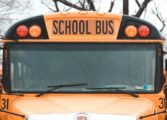The budget
Budget shortfalls aren’t new for Fluvanna County Schools, especially during the recent recession. The previous superintendent Tom Smith cited budget concerns for his decision to retire early. “People’s jobs worry me a lot,” said Smith in March of 2010. “I [moved] my retirement up because people’s jobs are too important … that should save money with next year’s budget.”
While Smith’s early retirement may have saved some money in long run, the budget that was handed to Keller when she took the reins was far from perfect. But nothing prepared Keller for the shock of May second’s Board of Supervisor’s meeting, which voted to cut this year’s school budget by $2.3 million.
“Without a doubt when that budget cut was made, in that moment, it was numbing,” said Keller. “I honestly remember the moment. It was just a blow, it was a tough blow for everybody.”
Keller went into fight or flight mode.
“I remember coming back to the office and contacting school board members, rallying my lead administrators at the central office level … we gathered our troops and said ‘how are we going to get through this?’” said Keller. “We spent days and days and days going back, combing through what we had spent, how we could cut, how we were going to share the burden.”
Now that they’ve had the whole summer to evaluate their current situation, is Fluvanna County Public Schools ready to face a new school year, with what Keller describes as “a bare bones budget?”
“Whew!” Keller breathes a sigh of exhaustion. “I feel we’re prepared. We have certainly met the budget cuts head on. If there is any message that I want to send, it’s that we’ve got to move on. We’ve already started meeting about the budget for next year.”
In those preparations for next year, Keller and Fluvanna County Public Schools Director of Finance Ed Breslauer, meet monthly with County Administrator Steve Nichols and County Finance Director Barbara Horlacher. Keller also plans to meet once a month with School Board Chair Camilla Washington and Board of Supervisors Chair Shaun Kenney.
“The primary focus there is for them to raise any questions that they already have and to understand the intricacies of school budgets,” said Keller.
The audit
At the last Board of Supervisors meeting, on Aug. 1, the Board of Supervisors voted to proceed with an adversarial audit of the schools’ budget by Robinson, Farmer, Cox (RFC) Associates. However, Fluvanna County schools have long been on a waitlist for an efficiency review from the Virginia Department of Education (VDOE) and the Virginia Department of Planning and Budget. According to the VDOE website, the objective of an efficiency review is to, “identify ways in which school divisions can realize cost savings in non-instructional areas in order to redirect those funds towards classroom activities.”
Currently, Fairfax County schools are ahead of Fluvanna on the waitlist, but according to Keller, “it’s possible that we will be doing two audits this year.” Nonetheless, Keller made it very clear that the VDOE audit would take precedence.
“It is extremely comprehensive, because it is orchestrated through the state Department of Education,” said Keller. “Whatever those results are, the expectation is that you proceed with their recommendations, whether it’s processes in finance, procurement, hiring, or whatever. The RFC audit is what it is. I think it’s a spring board for more conversation.”
In the meantime, Keller has begun a program called “Tuesdays with Ed” in which Director of Finance Ed Breslauer discusses school budget issues with the public.
“It’s a great opportunity for people to understand the budget situation, how much money is discretionary, and how federal money is slowly going away,” said Keller. “We had a seven percent loss in federal funds last year, that’s $200,000 out of the budget. I just think it’s important for the community to understand. It’s time intensive for our staff [to explain budgets], but it’s time well spent.”
The new high school
The good news amidst the still turbulent budget struggles is that the new high school will open. The official ribbon cutting was Sunday (Aug. 5).
“It gives me cold chills,” said Keller of her excitement. “I’ve never believed that the building itself drives a quality education, but I know that a building and the environment can be conducive to a different type of instruction – engaged instruction, project based learning, team building – we have to educate these children to compete globally. The reality is, the high school is here, so let’s embrace it and let’s make it work for this community.”
Keller went on to describe ways the building can be used to benefit the whole community, including opening it up for adult education classes in computer literacy.
Perhaps even better than a new building is that all of the so-called “learning cottages” are gone, thanks to the increased capacity. That’s right – no more trailers for Fluvanna County schools.
“Our children and our staff will operate within the confines of a building. That in itself I think helps the learning environment,” said Keller.
The future of Fluvanna education
As superintendent, Keller sets the tone for public education in the county. Political conversations concerning the subject of education are always on her mind.
“Across our nation there is so much dialogue of privatization of public education and better ways to do things,” said Keller. “We would be naïve and negligent if we weren’t always looking at ways to make education better, but what has happened is that it becomes a burden to bear.”
Namely, Keller feels that if too much time is spent on reforming education and analyzing budgets, that the teachers and staff feel unappreciated and the immediate needs of students are ignored.
“It’s very easy for teachers to think ‘my community doesn’t value public education’ and link that to the investment of funds,” said Keller. “Funding schools is an investment. It’s not about, nor should it ever be, about people’s personal agendas, people’s residual anger about decisions that were made before I ever got here. It’s so unfortunate when those things take priority, because it has a generational ripple effect on our children and that’s just wrong. We get what we pay for and we get what we invest in.”
Nevertheless, Keller is hopeful. She sees inspiration in her staff – whom she calls “very, very dedicated” – and in literacy results, which have steadily increased over the last two years.
“I love this community,” said Keller. “We’ll get through this. I love rural America. There are always growing pains and there are always going to be.”
“But if we don’t lift up and change our thinking about investing in our public education and really growing a local economy to help support that, then we are going to lose the very people who make it happen.”




